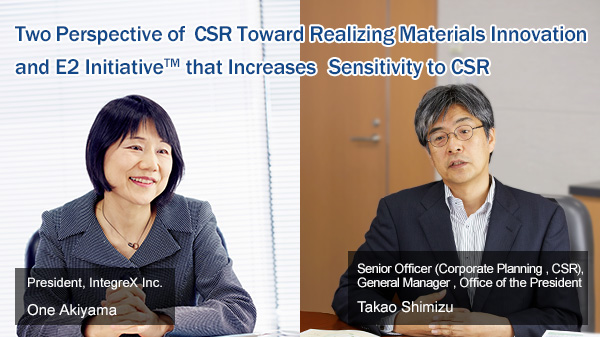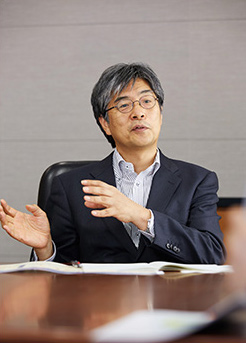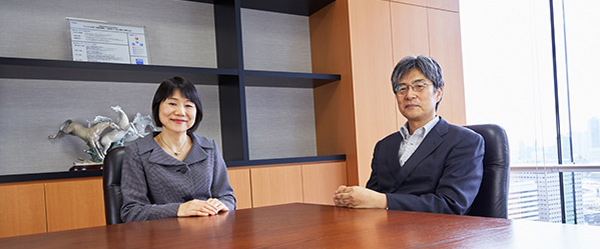

The term "CSR" began to be used in Japan around 2003. At first, most people understood the concept of CSR was centered on "compliance." Over 10 years have passed since that time, and enterprises are now searching for a way to interpret CSR in the context of their business and the world trend. Ms. Akiyama, who among stakeholders possesses a profound understanding of both domestic and overseas CSR from social viewpoints had a discussion with Shimizu, a JSR Senior Officer in charge of CSR, about the JSR’s ideal CSR.
Two perspectives of CSR: Active and Passive
- AKIYAMA:
- The JSR Group clearly articulates CSR as part of corporate management in formulating the previous Mid-Term Business Plan "JSR20i3". The current Mid-Term Business Plan "JSR20i6" surely inherits this view, but what process did you use to integrate CSR into business management?
- SHIMIZU:
- When formulating the previous Mid-Term Business Plan "JSR20i3", we reviewed the structure of our essential elements in order to act in accordance with the JSR Group corporate mission, "Materials Innovation". In the process, we considered the relationship with stakeholders, contributions to society through our business activity and variety of basic elements essential to our business process. The essential elements, which indicates corporate mission, management policies and course of action, is infused with a CSR stance for the JSR Group. For example, it clearly describes the responsibility to stakeholders in the management policy.
- AKIYAMA:
- The fact that CSR is clearly identified within the essential elements is wonderful. What becomes important next, then, is exactly how those essential elements are put into practice.
- SHIMIZU:
 The JSR Group views CSR in terms of 3 axes: The first is "Active CSR" to advance CSR further by promoting the business itself. Chemical companies play an important role in the society through providing variety of solutions in every aspect of the society. We also strive to contribute in providing solutions for social issues through our business.
The JSR Group views CSR in terms of 3 axes: The first is "Active CSR" to advance CSR further by promoting the business itself. Chemical companies play an important role in the society through providing variety of solutions in every aspect of the society. We also strive to contribute in providing solutions for social issues through our business.
The second is "Passive CSR" to address CSR from the view point of fundamental elements which are necessary when we conduct business, such as compliance and environmental consideration. For example, chemical companies use a lot of energy and resources in the manufacturing stage, and therefore, chemical companies have a great responsibility to reduce environmental impact by saving energy and using fewer resources. Our responsibility to the society, which is one of our stakeholders, is to make a correct response to those issues.
The third is JSR Group’s unique initiative. We consider the importance of the activities in environment and energy saving sector and implement the E2 InitiativeTM to function as a horizontal axle through both Active CSR and Passive CSR. The E2 InitiativeTM takes its name from the first letters of the two words "Eco-Innovation" and "Energy Management," and we believe that the feedback loop between both these "Es" is more important than each individual concept.

- AKIYAMA:
- Materials are something that we cannot do without in every product. The impact of your contribution to society through provision of materials is significant.
- SHIMIZU:
- For example, European countries have "The European Tyre Labelling Regulation" which require labeling of fuel-efficient tires, and our solution polymerization styrene-butadiene rubber (S-SBR), a synthetic rubber is used in such fuel-efficient tires, which consequently reduce the energy consumption in transportation. Our fine chemicals business provides materials for liquid crystal displays. They reduce the power consumption of TV, and contribute to low energy consumption not only in Japan but also overseas. It is obvious that we have to consider energy saving more than ever, and we are certain that the sectors we can contribute through our products will become even wider.
- AKIYAMA:
- In terms of the social issues of reducing CO2 emissions and reducing the environmental impact, materials technology can make a significant impact. But your products may not be very well known by general consumers, so it will be important for you to communicate them on this matter.
- SHIMIZU:
- In contrast to business to consumer (B2C) transactions that are visible to the consumer, there is no indication on the final products to show our products being used in business to business (B2B) transactions. So, it would be difficult for consumers to know about JSR Group's contribution. We would like to communicate these hardly visible contributions in a way that can be more recognizablte to the consumers.
- AKIYAMA:
- For these "hardly visible contributions" that you just mention, what kind of systems are in place on the production line?
- SHIMIZU:
- Regardless of the excellence of the product we manufacture, it would be meaningless if the production process damages the environment or uses large amounts of energy. So we are particularly careful to consider the ways in which we can minimize the burden on society and the environment in our production process. One of these is in energy consumption. We set a goal to see how much we could reduce the amount of CO2 emissions in comparison to that in 1990 and we have achieved this goal. We are also involved in initiatives to reduce environmental impact in terms of materials balance (relationship between resource consumption and environmental impact), including water. In addition, in the promotion of the E2 InitiativeTM we just discussed, we use our products in our own plants, rather than just selling them in the market. For example, we use latent heat storage materials, heat reflection materials, and lithium-ion capacitors (electricity storage devices) in order to manage energy consumption in our own plants as part of "Energy Management", and at the same time, we conduct verifications and tests on those products. We apply the results to our products and then introduce them to the market. It is one of the concept of "Eco-Innovation" loop. This loop between "Energy Management" and "Eco-Innovation" is the essential part of the concept of "E2 InitiativeTM".
- AKIYAMA:
- It is very convincing that the manufacturer use its own the products to obtain data and conduct tests in a very visible way. I understand that chemical manufacturers conduct business based on an extremely long supply chain from procurement of raw materials to supply to customers and then to final products that are visible to consumers who use them. The way that this supply chain is managed is also important, isn't it?
- SHIMIZU:
- We consider supply chain management to be a critical issue in Passive CSR. When thinking about the stages from procurement to manufacturing, shipping and then consumption, we need to think not only about CSR in the JSR Group, but also this entire long supply chain. In fiscal year 2010 we clarified our policy on CSR Procurement and are continuing to promote CSR activity that includes our suppliers. We conducted survey on the CSR activities of our supplier companies, and we found that all of our 100 plus suppliers have implemented CSR procurement. Of course, we too are considered as part of this supply chain when it is viewed from the perspective of our client companies, so we engage in CSR with an awareness that our company also supports this long supply chain.
Challenging New Issues
- AKIYAMA:
- Currently, new issues that are completely different from what went before are on the rise. These include human rights, and overseas labor problems, but the company must be particularly alert to such issues and work to address them.
- SHIMIZU:
- The Global Compact in which the JSR Group participates clearly includes human rights issues, and which has become part of our everyday consciousness with its specific identification in the JSR Group Principles of Corporate Ethics. Right now, more than 50% of the JSR Group sales are in overseas markets and half of those products sold there are also produced overseas. When considering the various ways in which perspectives and interests are changing in the global market, making strides in business to further increase the understanding of not only executives, but those on site as well, to the needs of society and social issues becomes important from the CSR perspective.
- AKIYAMA:
- While I am sure it is important to ensure that employees adopt corporate mission, I wonder how you help employees understand it.
- SHIMIZU:
- Immediately after we started the previous Mid-Term Business Plan "JSR20i3", we developed activities to help employees learn the corporate mission. While our employees discuss the corporate mission directly with the company’s executives, and CSR Report Presentation meetings, we conduct surveys to measure the degree to which the essential elements permeates employee mindsets. Even if employee understand concepts in words, ongoing efforts are required at a number of stages to assess understanding of how such concepts are related to each employee's work as well as to deepen each employee's comprehension. What is important is not simply an understanding of corporate mission, but that each division fulfills its role in bringing our corporate mission into action. It would be fantastic if, for example, Sales Department realizes needs and issues in a new market which does not overlap with the market for our existing product, and then it offers R&D and Planning departments such timely feedback in a method of streamlined collaboration that actualizes our corporate mission more than ever before.
CSR in the Future
- AKIYAMA:
- This means that all those who work for the JSR Group are involved in Materials Innovation. I think the importance of this is to realize the relationship between your own work and the corporate mission.
- SHIMIZU:
- The E2 InitiativeTM we discussed earlier is effective in raising the level of understanding of those relationship. For example, if our "Energy Management " related technology, such as energy saving material, is actually utilized for the new product development related to the "Eco-Innovation" concept, the relationship between, the relationship between corporate mission and our work by every employee would be clearer. We have a classification, at the product level, "Environmentally Friendly Products", but also believe that it is important to present the E2 InitiativeTM concept and to establish one of the JSR Group brand.
- AKIYAMA:
- I think E2 InitiativeTM is an excellent choice of name. It is important, I think, to call public attention through things like this. Have you any initiatives in progress for new issues?
- SHIMIZU:
- Among the numerous issues including the globalization of the organization, we believe that diversity is one of the key management issues. In particular, we focus on active support for female employees, which is not only a JSR Group’s issue, but an issue in the society. Society will not grow unless we fully utilize the talents of female resources. Chemicals companies face the reality that the number of female employees is rather small, but it is critical that we understand that diversity that includes women and diverse values, and a system to utilize them in management are needed to achieve future growth. In June 2015, we established a Diversity Promotion Office to improve the efforts on this issue.
- AKIYAMA:
- I am sure there are still a lot of issues, but I can see that you are committed to a stance in which you face these head-on from a variety of perspectives. What will be the future direction the JSR Group pursues for CSR initiatives?
- SHIMIZU:
- Unless there are significant social changes, we will proceed the current three axes without change. Moreover, we will accelerate ongoing CSR efforts on global issues that will only further increase from now on, diversity issues, and responsibility to various stakeholders. We are fully aware of the ways in which we disseminate information to further understanding of JSR Group activities both internally and externally.
- AKIYAMA:
- Your corporate mission is fully systematized, and it would be important next to have people further "sympathize" JSR Group philosophy.
- SHIMIZU:
- Yes, that's right. Promoting that philosophy is what Materials Innovation means to me.
IntegreX Inc. President and CEO
One Akiyama
Upon graduation from Keio University in 1983, Akiyama worked mainly as a trader at a foreign-affiliated securities company. She completed graduate school at Aoyama Gakuin University in 1998 and obtained a United States Certified Public Accountant (USCPA). She worked for a securities company again. She established IntegreX Inc. in 2001 and is working to popularize socially responsible investing. Her chief publications include "What is Socially Responsible Investment (SRI) - To support good companies for a long time".


 The JSR Group views CSR in terms of 3 axes: The first is "Active CSR" to advance CSR further by promoting the business itself. Chemical companies play an important role in the society through providing variety of solutions in every aspect of the society. We also strive to contribute in providing solutions for social issues through our business.
The JSR Group views CSR in terms of 3 axes: The first is "Active CSR" to advance CSR further by promoting the business itself. Chemical companies play an important role in the society through providing variety of solutions in every aspect of the society. We also strive to contribute in providing solutions for social issues through our business.